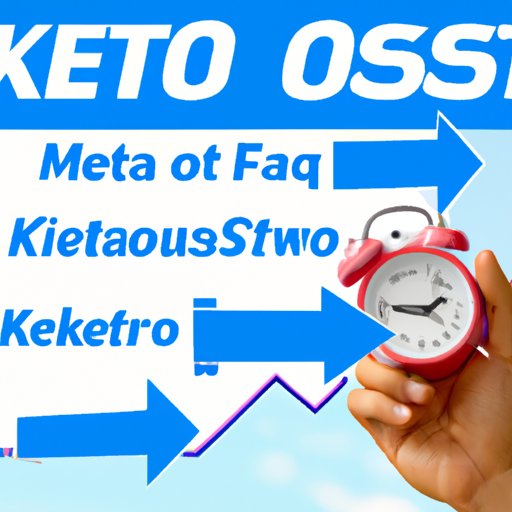Introduction
Ketosis is a natural metabolic state that occurs when the body doesn’t have enough carbohydrates to burn for energy. Instead, it begins to break down stored fat into molecules called ketones, which are then used as an alternate energy source. It’s commonly associated with the high-fat, low-carbohydrate ketogenic diet, but it can also be achieved through fasting, exercise, or supplemental ketones.
Reaching ketosis is important because when your body is in this state, it’s burning fat for fuel instead of glucose. Burning fat for fuel helps you lose weight and keep it off, as well as providing a host of other health benefits such as improved cognitive function and reduced risk of certain diseases.
How Long Does it Take to Reach Ketosis?
The amount of time it takes to reach ketosis varies from person to person, depending on a variety of factors. It can take anywhere from a few days to several weeks for someone to enter a state of ketosis.
Factors That Affect the Timeline
There are several factors that influence how quickly someone will reach ketosis. These include their current diet, activity level, age, body composition, and overall health. For example, people who are already on a low-carbohydrate diet may enter ketosis more quickly than those who are still eating a high-carbohydrate diet.
Another factor is the type of ketogenic diet being followed. Different types of ketogenic diets require different macronutrient ratios, and some may be more difficult to achieve than others. For instance, the standard ketogenic diet requires a very low carbohydrate intake (usually less than 50 grams per day) and a moderate protein intake (around 20-30% of total calories). This can be difficult to maintain over the long term, so some people may find it takes longer to reach ketosis if they’re following this type of diet.

The Average Time Frame for Reaching Ketosis
Most people reach ketosis within two to four weeks of starting a ketogenic diet. However, it can take up to eight weeks for some people depending on their current diet, activity level, and other factors. The length of time it takes to reach ketosis also depends on how strictly someone follows the ketogenic diet and how quickly their body adjusts to burning fat instead of carbohydrates.

The Timeline of Reaching Ketosis: What to Expect
When starting a ketogenic diet, most people experience a period of adjustment as their body adapts to the new way of eating. Here’s an overview of what to expect during the timeline of reaching ketosis:
First Few Days
During the first few days of a ketogenic diet, you might experience some side effects such as headaches, fatigue, nausea, and difficulty concentrating. This is known as the “keto flu” and is caused by the sudden shift in your body’s fuel sources. It should pass within a few days as your body adjusts to the new diet.
2-3 Weeks
By week two or three, you should start to feel better as your body becomes more accustomed to using fat for fuel. You may also start to notice some weight loss as your body starts to burn fat for energy.
4+ Weeks
After four weeks, many people will have reached a state of ketosis. If you haven’t yet, don’t worry – it just means it’s taking your body a bit longer to make the switch. Keep following the ketogenic diet and you should eventually reach ketosis.
Ketosis: How Quickly Can You Get Into Ketosis?
While everyone’s timeline for entering ketosis is different, there are some strategies you can use to speed up the process. Here are some dietary and lifestyle habits that can help you get into ketosis faster:
Dietary Strategies
The most important thing you can do to help your body reach ketosis is to follow a strict ketogenic diet. This means reducing your carbohydrate intake to less than 50 grams per day and increasing your fat intake to make up the rest of your calories. Eating plenty of healthy fats, such as olive oil, avocado, and nuts, can help your body transition into ketosis.
Exercise
Regular exercise is another great way to speed up the process of entering ketosis. Exercise increases the demand for energy, which forces your body to turn to its fat stores for fuel. Aim for at least 30 minutes of moderate-intensity exercise each day.
Supplements
Certain supplements, such as exogenous ketones, can also help you enter ketosis more quickly. Exogenous ketones are ketones that are produced outside of the body and consumed as a supplement. They provide your body with an immediate source of energy, which can help kickstart the process of ketosis.
A Comprehensive Guide to Understanding Ketosis
Ketosis is a natural metabolic state that occurs when the body doesn’t have enough carbohydrates to burn for energy. It’s often associated with the ketogenic diet, but it can also be achieved through fasting, exercise, or supplemental ketones. Knowing what ketosis is and understanding its benefits and risks can help you decide if it’s right for you.
What is Ketosis?
Ketosis is a metabolic state in which the body uses stored fat for energy instead of carbohydrates. When the body doesn’t have enough carbohydrates to burn for energy, it begins to break down stored fat into molecules called ketones, which are then used as an alternate energy source.
Benefits of Ketosis
The primary benefit of ketosis is weight loss. When your body is in a state of ketosis, it’s burning fat for fuel instead of glucose. This helps you lose weight and keep it off, as well as providing a host of other health benefits such as improved cognitive function and reduced risk of certain diseases.
Risks of Ketosis
Ketosis is generally safe for most people, but it does come with some potential risks. These include dehydration, electrolyte imbalances, and an increased risk of kidney stones. It’s important to talk to your doctor before starting a ketogenic diet to make sure it’s the right choice for you.
How to Reach Ketosis in the Quickest Possible Time
If you want to reach ketosis as quickly as possible, there are several things you can do. First, follow a strict ketogenic diet, which means reducing your carbohydrate intake to less than 50 grams per day and increasing your fat intake to make up the rest of your calories. You should also exercise regularly and consider taking exogenous ketone supplements.

Tips for Accelerating Into Ketosis Faster
Here are some additional tips for speeding up the process of entering ketosis:
Increase Fat Intake
Increasing your fat intake can help your body transition into ketosis more quickly. Make sure to choose healthy fats like olive oil, avocado, and nuts.
Reduce Carbs
Reducing your carbohydrate intake to less than 50 grams per day can help you enter ketosis faster. Avoid high-carb foods like bread, pasta, and sugary snacks.
Intermittent Fasting
Intermittent fasting is a popular strategy for accelerating ketosis. During intermittent fasting, you eat all of your meals within a certain window of time each day, usually 8-12 hours. This helps reduce your carbohydrate intake and encourages your body to burn fat for energy.
Exercise
Regular exercise helps your body adjust to using fat for fuel. Aim for at least 30 minutes of moderate-intensity exercise each day.
Monitor Ketone Levels
Monitoring your ketone levels is a good way to determine if you’ve reached ketosis. There are several ways to measure ketone levels, including urine strips and blood tests.
Conclusion
Reaching ketosis can take anywhere from a few days to several weeks, depending on a variety of factors. To speed up the process, follow a strict ketogenic diet, exercise regularly, and consider taking exogenous ketone supplements. Monitor your ketone levels to determine if you’ve reached ketosis.
(Note: Is this article not meeting your expectations? Do you have knowledge or insights to share? Unlock new opportunities and expand your reach by joining our authors team. Click Registration to join us and share your expertise with our readers.)
